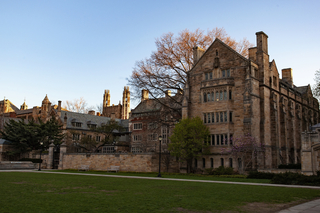The Ph.D. degree qualifies the candidate to teach comparative literature as well as one or two national or language-based literatures of her/his specialization.
Students may specialize in any languages and cultures, to the extent that they are sufficiently covered at Yale (or, by arrangement, at neighboring universities). The following sections describe the requirements for the Ph.D. degree in Comparative Literature.
Normally, a student takes courses in his or her first two years; teaches as a TA during the third and fourth year; receives a Dissertation Fellowship when he or she is ready to write the dissertation, usually in the fifth or sixth year. The Graduate School will exceptionally approve registration in the seventh year but no later.
What follows in this section is a descriptive rather than prescriptive calendar. It should be read as a gloss on the information found elsewhere on the department’s web page and in the current Yale University Graduate School Programs and Policies. Each student’s career in the Ph.D. program will differ somewhat from that of other students, depending upon prior preparation, the nature of the student’s particular area of specialization, and other factors. On the other hand, both the Graduate School and the Department have certain regulations and expectations with which all students must comply, and exceptions are only rarely made. Consult the Director of Graduate Studies (DGS) regarding any questions about the regulations set forth in Programs and Policies or about this calendar.
Funding
Please note well that this is a guide to your six years of funded residence at Yale. It is common for graduate students to interrupt and supplement their studies at Yale with a year of research and/or study overseas (typically funded by external grants such as the Fulbright, the Light fellowship, or the Baden-Württemberg Exchange). Students typically apply for such funding in the summer of their third year and plan to spend the fourth year away from Yale. Please confer early and closely with your adviser and the Director of Graduate Studies in planning your schedule for study abroad.
Applications for grants from the Graduate School, the Macmillan Center at Yale and other internal grants for summer language study and research travel are typically solicited late in the fall term and early in the spring term. Students should make their summer plans as early as possible and should be prepared to apply for these grants when they are announced. Students should be aware that application deadlines for grants for dissertation study abroad typically fall in the later summer or early fall of the year before the supported year.
Advising
Students should plan to meet with their adviser and DGS early in the fall term every year. The DGS will typically make available extra office hours to accommodate such meetings or will hold group meetings by cohort to discuss deadlines, expectations and plans for the upcoming year. Students are encouraged to also set up relevant meetings before or after spring break to discuss summer plans.

Placement
The Department appoints a Job Placement Officer who works with the DGS to help advanced graduate students (fifth years and above) prepare for the job market. A preliminary meeting typically takes place in late April or early May, followed by individual and group meetings throughout the fall. A basic “handbook” is available from the Graduate Registrar to help students applying specifically for academic appointments. The Center for Teaching and Learning and the Office of Career Strategy also offer many workshops and advising services to assist students in their search for employment upon completion of their degrees, including teaching appointments, post-doctoral fellowships, and other kinds of employment and career planning. All graduate students are urged to avail themselves of these services, which include dossier services. For academic year 2025-2026 the placement officer is Moira Fradinger.
Have any other questions?
You may contact the graduate registrar in the Comparative Literature department, Sabrina Whiteman, with any further questions or concerns.
